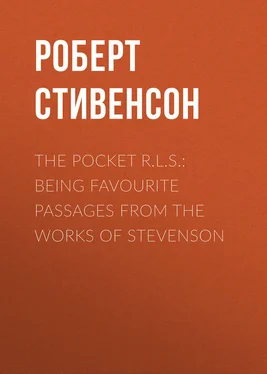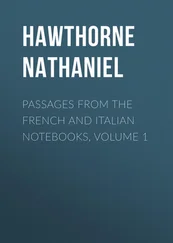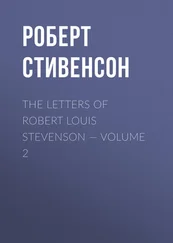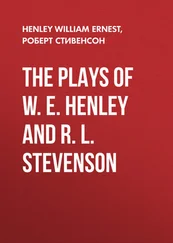Роберт Стивенсон - The Pocket R.L.S. - Being Favourite Passages from the Works of Stevenson
Здесь есть возможность читать онлайн «Роберт Стивенсон - The Pocket R.L.S. - Being Favourite Passages from the Works of Stevenson» — ознакомительный отрывок электронной книги совершенно бесплатно, а после прочтения отрывка купить полную версию. В некоторых случаях можно слушать аудио, скачать через торрент в формате fb2 и присутствует краткое содержание. Жанр: literature_19, foreign_antique, foreign_prose, на английском языке. Описание произведения, (предисловие) а так же отзывы посетителей доступны на портале библиотеки ЛибКат.
- Название:The Pocket R.L.S.: Being Favourite Passages from the Works of Stevenson
- Автор:
- Жанр:
- Год:неизвестен
- ISBN:нет данных
- Рейтинг книги:4 / 5. Голосов: 1
-
Избранное:Добавить в избранное
- Отзывы:
-
Ваша оценка:
- 80
- 1
- 2
- 3
- 4
- 5
The Pocket R.L.S.: Being Favourite Passages from the Works of Stevenson: краткое содержание, описание и аннотация
Предлагаем к чтению аннотацию, описание, краткое содержание или предисловие (зависит от того, что написал сам автор книги «The Pocket R.L.S.: Being Favourite Passages from the Works of Stevenson»). Если вы не нашли необходимую информацию о книге — напишите в комментариях, мы постараемся отыскать её.
The Pocket R.L.S.: Being Favourite Passages from the Works of Stevenson — читать онлайн ознакомительный отрывок
Ниже представлен текст книги, разбитый по страницам. Система сохранения места последней прочитанной страницы, позволяет с удобством читать онлайн бесплатно книгу «The Pocket R.L.S.: Being Favourite Passages from the Works of Stevenson», без необходимости каждый раз заново искать на чём Вы остановились. Поставьте закладку, и сможете в любой момент перейти на страницу, на которой закончили чтение.
Интервал:
Закладка:
It is almost as if the millennium were arrived, when we shall throw our clocks and watches over the housetops, and remember time and seasons no more. Not to keep hours for a lifetime is, I was going to say, to live for ever. You have no idea, unless you have tried it, how endlessly long is a summer’s day that you measure out only by hunger, and bring to an end only when you are drowsy.
I know a village where there are hardly any clocks, where no one knows more of the days of the week than by a sort of instinct for the fete on Sundays, and where only one person can tell you the day of the month, and she is generally wrong; and if people were aware how slow Time journeyed in that village, and what armfuls of spare hours he gives, over and above the bargain, to its wise inhabitants, I believe there would be a stampede out of London, Liverpool, Paris, and a variety of large towns, where the clocks lose their heads, and shake the hours out each one faster than the other, as though they were all in a wager. And all these foolish pilgrims would each bring his own misery along with him, in a watch-pocket!
The bed was made, the room was fit,
By punctual eve the stars were lit;
The air was still, the water ran;
No need there was for maid or man,
When we put us, my ass and I,
At God’s green caravanserai.
To wash in one of God’s rivers in the open air seems to me a sort of cheerful solemnity or semi-pagan act of worship. To dabble among dishes in a bedroom may perhaps make clean the body; but the imagination takes no share in such a cleansing.
I own I like definite form in what my eyes are to rest upon; and if landscapes were sold, like the sheets of characters of my boyhood, one penny plain and twopence coloured, I should go the length of twopence every day of my life.
There should be some myth (but if there is, I know it not) founded on the shivering of the reeds. There are not many things in nature more striking to man’s eye. It is such an eloquent pantomime of terror; and to see such a number of terrified creatures taking sanctuary in every nook along the shore is enough to infect a silly human with alarm. Perhaps they are only a-cold, and no wonder, standing waist deep in the stream. Or, perhaps, they have never got accustomed to the speed and fury of the river’s flux, or the miracle of its continuous body. Pan once played upon their forefathers; and so, by the hands of his river, he still plays upon these later generations down all the valley of the Oise; and plays the same air, both sweet and shrill, to tell us of the beauty and the terror of the world.
The reeds might nod their heads in warning, and with tremulous gestures tell how the river was as cruel as it was strong and cold, and how death lurked in the eddy underneath the willows. But the reeds had to stand where they were; and those who stand still are always timid advisers.
The wholeday was showery, with occasional drenching plumps. We were soaked to the skin, then partially dried in the sun, then soaked once more. But there were some calm intervals, and one notably, when we were skirting the forest of Mormal, a sinister name to the ear, but a place most gratifying to sight and smell. It looked solemn along the riverside, drooping its boughs into the water, and piling them up aloft into a wall of leaves. What is a forest but a city of nature’s own, full of hardy and innocuous living things, where there is nothing dead and nothing made with the hands, but the citizens themselves are the houses and public monuments? There is nothing so much alive and yet so quiet as a woodland; and a pair of people, swinging past in canoes, feel very small and bustling by comparison.
I wish our way had always lain among woods. Trees are the most civil society. An old oak that has been growing where he stands since before the Reformation, taller than many spires, more stately than the greater part of mountains, and yet a living thing, liable to sicknesses and death, like you and me: is not that in itself a speaking lesson in history? But acres on acres full of such patriarchs contiguously rooted, their green tops billowing in the wind, their stalwart younglings pushing up about their knees; a whole forest, healthy and beautiful, giving colour to the light, giving perfume to the air; what is this but the most imposing piece in nature’s repertory?
But indeed it is not so much for its beauty that the forest makes a claim upon men’s hearts, as for that subtle something, that quality of the air, that emanation from the old trees, that so wonderfully changes and renews a weary spirit.
With all this in mind, I have often been tempted to put forth the paradox that any place is good enough to live a life in, while it is only in a few, and those highly favoured, that we can pass a few hours agreeably. For, if we only stay long enough, we become at home in the neighbourhood. Reminiscences spring up, like flowers, about uninteresting corners. We forget to some degree the superior loveliness of other places, and fall into a tolerant and sympathetic spirit which is its own reward and justification.
For when we are put down in some unsightly neighbourhood, and especially if we have come to be more or less dependent on what we see, we must set ourselves to hunt out beautiful things with all the ardour and patience of a botanist after a rare plant. Day by day we perfect ourselves in the art of seeing nature more favourably. We learn to live with her, as people learn to live with fretful or violent spouses: we dwell lovingly on what is good, and shut our eyes against all that is bleak or inharmonious. We learn, also, to come to each place in the right spirit. The traveller, as Brantome quaintly tells us, ‘fait des discours en soi pour se soutenir en chemin.’
There is no end, indeed, to making books or experiments, or to travel, or to gathering wealth. Problem gives rise to problem. We may study for ever, and we are never as learned as we would. We have never made a statue worthy of our dreams. And when we have discovered a continent, or crossed a chain of mountains, it is only to find another ocean or another plain upon the farther side. In the infinite universe there is room for our swiftest diligence and to spare. It is not like the works of Carlyle, which can be read to an end. Even in a corner of it, in a private park, or in the neighbourhood of a single hamlet, the weather and the seasons keep so deftly changing that although we walk there for a lifetime there will be always something to startle and delight us.
It is in virtue of his own desires and curiosities that any man continues to exist with even patience, that he is charmed by the look of things and people, and that he wakens every morning with a renewed appetite for work and pleasure. Desire and curiosity are the two eyes through which he sees the world in the most enchanted colours: it is they that make women beautiful or fossils interesting: and the man may squander his estate and come to beggary, but if he keeps these two amulets he is still rich in the possibilities of pleasure.
To look on the happy side of nature is common, in their hours, to all created things. Some are vocal under a good influence, are pleasing whenever they are pleased, and hand on their happiness to others, as a child who, looking upon lovely things, looks lovely. Some leap to the strains with unapt foot, and make a halting figure in the universal dance. And some, like sour spectators at the play, receive the music into their hearts with an unmoved countenance, and walk like strangers through the general rejoicing. But let him feign never so carefully, there is not a man but has his pulses shaken when Pan trolls out a stave of ecstasy and sets the world a-singing.
Science writes of the world as if with the cold finger of a starfish; it is all true; but what is it when compared to the reality of which it discourses? where hearts beat high in April, and death strikes, and hills totter in the earthquake, and there is a glamour over all the objects of sight, and a thrill in all noises for the ear, and Romance herself has made her dwelling among men? So we come back to the old myth, and hear the goat-footed piper making the music which is itself the charm and terror of things; and when a glen invites our visiting footsteps, fancy that Pan leads us thither with a gracious tremolo; or when our hearts quail at the thunder of the cataract, tell ourselves that he has stamped his hoof in the nigh thicket.
Читать дальшеИнтервал:
Закладка:
Похожие книги на «The Pocket R.L.S.: Being Favourite Passages from the Works of Stevenson»
Представляем Вашему вниманию похожие книги на «The Pocket R.L.S.: Being Favourite Passages from the Works of Stevenson» списком для выбора. Мы отобрали схожую по названию и смыслу литературу в надежде предоставить читателям больше вариантов отыскать новые, интересные, ещё непрочитанные произведения.
Обсуждение, отзывы о книге «The Pocket R.L.S.: Being Favourite Passages from the Works of Stevenson» и просто собственные мнения читателей. Оставьте ваши комментарии, напишите, что Вы думаете о произведении, его смысле или главных героях. Укажите что конкретно понравилось, а что нет, и почему Вы так считаете.












